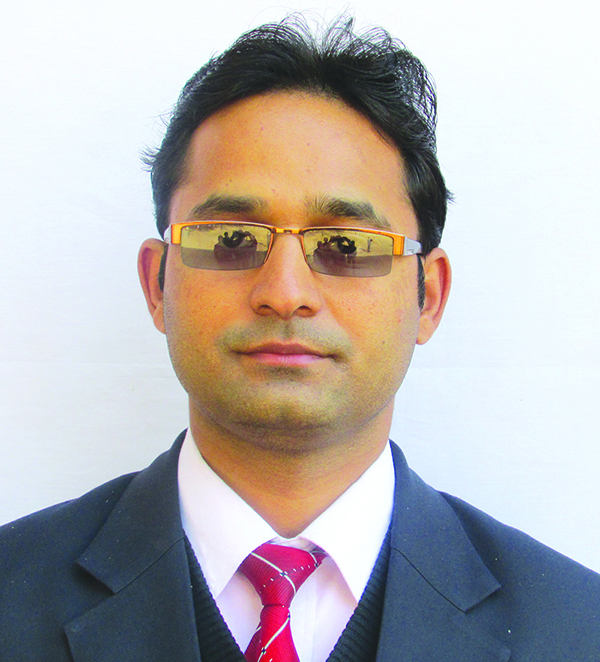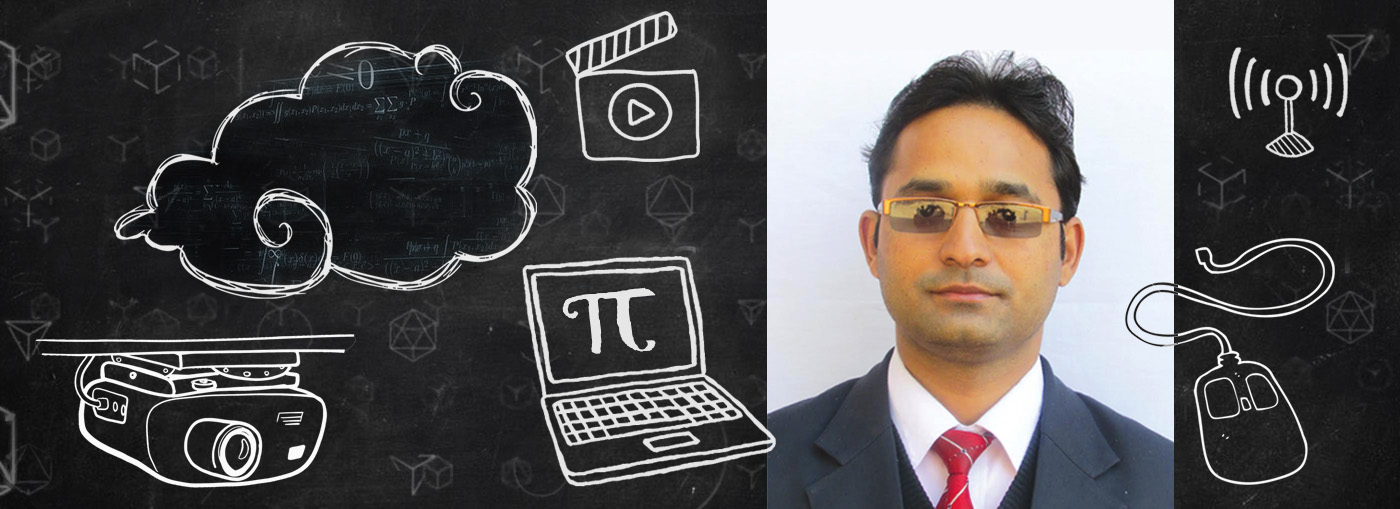Please tell us about ‘Math Vilage’. Why did you choose to start it? What is the response of students so far?
Math Vilage is a blog focused on mathematical resources for learners and teachers. It contains current news, class room resources, model questions with their solutions, mathematical modeling, recent technology, motivational resources, formula, quizzes and student’s sections. All the resources are free.
Right now in Nepal, students learn mathematics in classroom but don’t see it in practice. My aim is to make mathematics more practical, easy, interesting and applicable to daily life. Nowadays, many people have smart phones, and even a child spends about 3 hours on digital devices. However, students and teachers don’t look for mathematical resources because they don’t know where to find what they need. So, I came up with this website to fulfill their needs. Math Vilage is worth a visit for students and teachers, whether they are in Nepal or abroad.
I have received many suggestions, viewers, supports and comments regarding the blog. Many students and teachers are visiting the blog, and have suggested publishing quality materials which fulfill their needs. This has been very encouraging.
How many hours do you invest in Math Vilage every week and every month? How do you maintain your motivation?
There are no hard and fast rules for the time I invest in Math Vilage. During the site’s early days, I spent several days and nights working round the clock. But, professionally I am a teacher and I create mathematical resources for students in school. So I usually spend 3 hours a day creating materials and making lesson plans, post one article once a week and summarize all activities on the blog once a week. The increasing popularity of the website encourages me to create more posts and articles, and I am motivated by the support, suggestions and comments from the viewers.
In what other ways do you incorporate technology into your teaching practice? Why do you think technology in teaching is important?
Teaching is an art. The way music enhances a song is exactly how using technology in the classroom enhances learning. Technology has become indispensable to teaching in this 21 st century. In developed countries, everyone from children to the elderly are used to these tools. Even in Nepal, people are already obsessed with technology, feeling restless when they are without their smart phone. Today, if technology isn’t incorporated into teaching, learning will be incomplete. The use of technology will make learning more effective and interesting.
How did you become a math teacher? What was your inspiration? Why do you think math education is important?
I have an interesting story about how I became a mathematics teacher. When I was in grade nine, I had to choose between mathematics and geography. I chose geography over mathematics but my mathematics teacher Mr. Shreekanta Ghimire encouraged me to drop geography and take mathematics instead. He motivated me and bought me a mathematics book himself.
But studying due to fear and pressure proved abortive. A year later, I had given up on mathematics. My teacher counseled me again and eventually, I did well. I also remember my teacher, Mr. Shiva Lamichhane who helped me improve in mathematics. My teachers inspired me in a lot of ways, opening the door for me. Eventually, I entered through voluntarily. My experience helps me counsel my students on doing well in mathematics.
I think a passion for mathematics is for life, and also that life is incomplete without mathematics. Mathematics is the language of the nature. It is important even in daily life activities. We don’t need to go to school to learn mathematics; we are learning it each and every second.
Do you think people in the education sector in Nepal have sufficiently understood the importance of integrating technology in classrooms?
Yes, people in the education sector have understood the importance of integrating technology in classroom teaching but they have been working without a proper plan and research. Some schools who have used ICT have seen improvements, but these are small compared to results seen in other countries.
Have you been collaborating with other teachers who are interested in integrating technology for education?
Yes, we have launched “ICT in education” project at our school, Gandaki Boarding School (Regional School), where I am currently working. We have a multimedia projector with audio-visual system in each class, a mathematics lab and an ICT building with modern equipment. I have been teaching different skills: using IT in classroom teaching, preparing digital lesson plans, making animations, video editing, preparing PowerPoint presentations, using GeoGebra, Desmos in classroom teaching, and so on. In addition, I have also been supporting and training teachers of Jhapa, Kathmandu, Kaski, Syangja and Chitwan, including online training for teachers who cannot travel to attend.
What are the opportunities and challenges you face while incorporating technology in teaching?
There are several opportunities for students, teachers, administrators and government. Increase in learning access, flexibility of contents and lessons, collaboration and integration, new discovery approach, recent information, motivation, high quality of education and a new way of learning are some of the benefits of technology in teaching. The teachers can collaborate, learn skills and increase productivity. They will develop a novel culture of teaching and learning, minimizing cost and maximizing working efficiency. Ease at handling in administration, minimizing cost and manpower, ease at providing information to the students, teachers, parents and governmental bodies are main advantages.
Beside these opportunities there are several challenges we need to face while incorporating technology in teaching:
- Most teachers are not IT friendly
- It is very costly to manage IT systems
- Problem of internet and electricity
- Unavailability of proper software
- Lack of skilled manpower
- Reluctance of teachers and administration
You have been teaching math for more than 17 years now. What are your observations regarding math education in Nepal? Have your ideas about math education remained same or changed in those years?
Sure! We have more experienced teachers, and it has made the teaching profession sharp.
However, I think teachers should update themselves, and teaching materials should also be updated with time. I have been teaching for more than 17 years and with time, I have adapted to curriculum, textbooks, IT and student interests with time.
In terms of math education in Nepal, the interest in learning mathematics is decreasing. The number of students studying mathematics at the college level is also decreasing. I have been looking into the reasons for this, and I think the content is to blame. The theory is not developed fully, and there is no practical application provided. To be effective, the content must answer the following things:
- Why should you learn?
- Where does it apply?
- What is its importance in a practical field?
- How does it help my future career?
The curriculum must also be updated regularly. In Nepal, the curriculum is being changed, but the content is still the same. I am still teaching the content I learnt 22 years ago. I also think that mathematics should be compulsory throughout school, but recently in grade 11 and 12, it has been made optional. My suggestion is that mathematics be kept compulsory, with at least 25% practical and project-based classes. Similarly, there must be sufficient research and experimentation before implementing a new curriculum.
How do you see the future of technology in education in Nepal?
There are immense possibilities for the use of technology in education in Nepal. Our geography makes it difficult to train teachers and students, but technology can help. People from the east to the west can communicate directly through the internet and share their knowledge. Virtual classes can be launched throughout the country. There won’t be problems regarding availability of textbooks if IT reaches all the schools of Nepal.
Nepalese students have learnt various courses from reputed universities of the world. For instance, I myself have taken several online classes from American universities. Hence, there are good prospects for technology and education in Nepal.
What are your personal plans towards integrating technology in math education?
I have been training teachers in my locality and within the country on the use of technology in classroom teaching. It is a continuous process that I will be involved in. Besides this, I will always share new things on my blog Math Vilage, my YouTube channel I Can Learn Mathematics, Face book page I Can Learn Mathematics. I will be preparing more videos and materials to share in social media. Also, I would like to suggest mathematics teachers to use at least GeoGebra, desmos.com and actively inspire student in classroom teaching. If teachers have any problems, they can send a message on my Facebook page I can learn Mathematics, I will help free of cost.
What are your words of advice for the teachers who want to incorporate technology in their own teaching practices?
I would like to advise the following things to teachers who want to incorporate technology in classroom teaching:
- Be ready to learn a new technology.
- Learn minimum skills of technology: Microsoft Word, PowerPoint, GeoGebra, Desmos, Video Editing, MS Paint, etc.
- Request school administration to buy laptops/ desktops, projectors, smart board/ interactive board and internet facility.
- Interact with the technology-friendly teachers and friends.
- Always share what you have learnt.
What are your words of advice for someone who wants to become a math teacher?
First, teachers should know themselves before becoming teachers. Who are you? What do you enjoy doing? How do you plan your teaching? How do you prepare your lesson? Are your habits child friendly? Do you know child psychology? Can you inspire and motivate students?
Second, teachers should be able to read students. Who they are? What is their family background, economic status, age and ethnic and cultural groups?
Third, you should start reading books and prepare your lessons to be an effective teacher. Teachers should have a passion, a passion to learn and teach both at the same time. Finally, I would like to advise the teachers to be up to date with the latest technology. Today’s Bachelor’s degree holders will be equal to tomorrow’s illiterate population when they stop learning. So, don’t stop learning.

Khadak Raj Adhikari is a Mathematics teacher at Gandaki Boarding School, Lamachaur Pokhara. He has been teaching mathematics at different levels since 2001. He is very passionate about using technology in teaching Mathematics. He runs Math Vilage as a portal to share useful concepts, facts, figures, videos and relevant links for anyone who wants to learn and teach mathematics.
He has M.Ed. in Mathematics. He has completed webinar-based E-Teacher Scholarship Program from the University of Oregon, funded by the United States Department of State.

good news . i want to learn it.
Really amazing . the great and perfect work sir. Thank you